
IMPLANT SUPPORTED DENTURES
IMPLANT SUPPORTED
DENTURES FOR MISSING TEETH
Our implant-supported dentures are designed to help you achieve greater stability in chewing and speaking. Our team of experienced dentists will work with you to create treatment plans tailored to your needs to improve your quality of life.


Why Choose Dentures for Missing Teeth?
Missing teeth can have a serious impact on your oral health, appearance, and quality of life. When teeth are lost, the surrounding bone begins to shrink due to lack of stimulation. This bone loss not only alters your facial structure, giving a sunken appearance, but also affects how well you can chew and speak. The gaps left by missing teeth may cause neighboring teeth to shift, leading to bite issues.
Dentures offer a reliable solution to these problems. They help restore your smile and facial structure, allowing you to chew, speak, and eat more comfortably. Beyond aesthetics, dentures can also prevent further oral complications by maintaining the alignment of your teeth.
Long-Term Benefits of Implants Over Other Solutions
While traditional dentures help replace missing teeth, implant-supported dentures offer more stability and longevity. Traditional dentures often slip and move, requiring adhesives for security, which can be uncomfortable. Implant-supported dentures, however, are anchored in the jawbone using titanium implants, providing a stable and long-lasting solution.
Implants also promote jawbone health by mimicking natural tooth roots, preventing bone resorption over time. This not only improves the fit of the dentures but also preserves your facial structure. Additionally, unlike dental bridges, implants don’t require altering neighboring healthy teeth, making them a more protective solution.
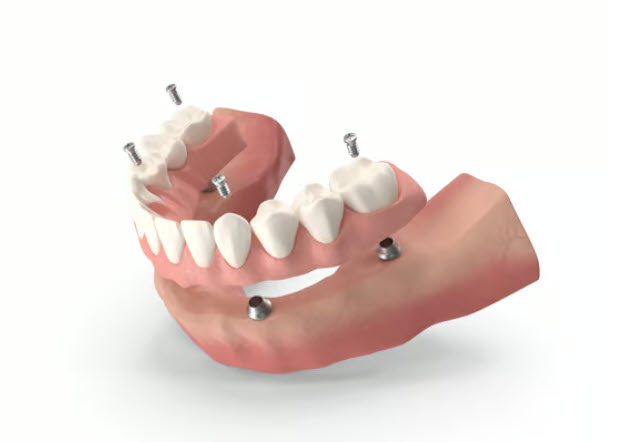

Enhanced Comfort and Function
Implant-supported dentures provide a more natural chewing experience, which means you can enjoy a wider variety of foods. They are designed to look and function like real teeth, improving your confidence, comfort, and quality of life.
While both traditional and implant-supported dentures can replace missing teeth, the long-term stability, bone preservation, and comfort provided by implants make them the superior option for many people.
WHAT ARE IMPLANT SUPPORTED
DENTURES?
Implant supported dentures are restorative dental devices designed to replace missing teeth. Whether you’ve lost teeth due to decay, injury, or age, implant supported dentures can restore your oral function and improve your quality of life.
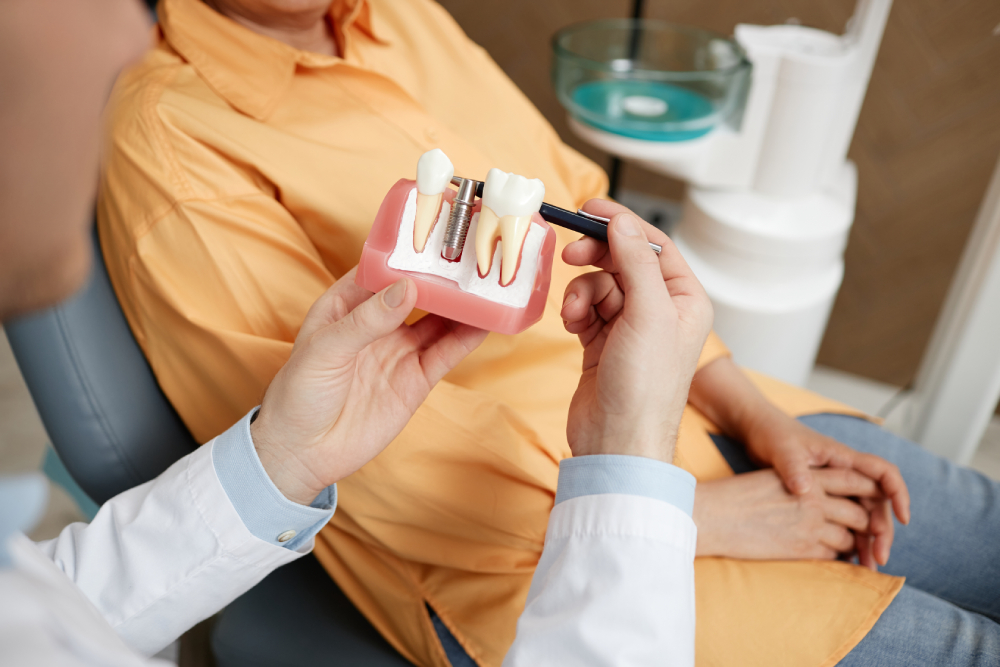
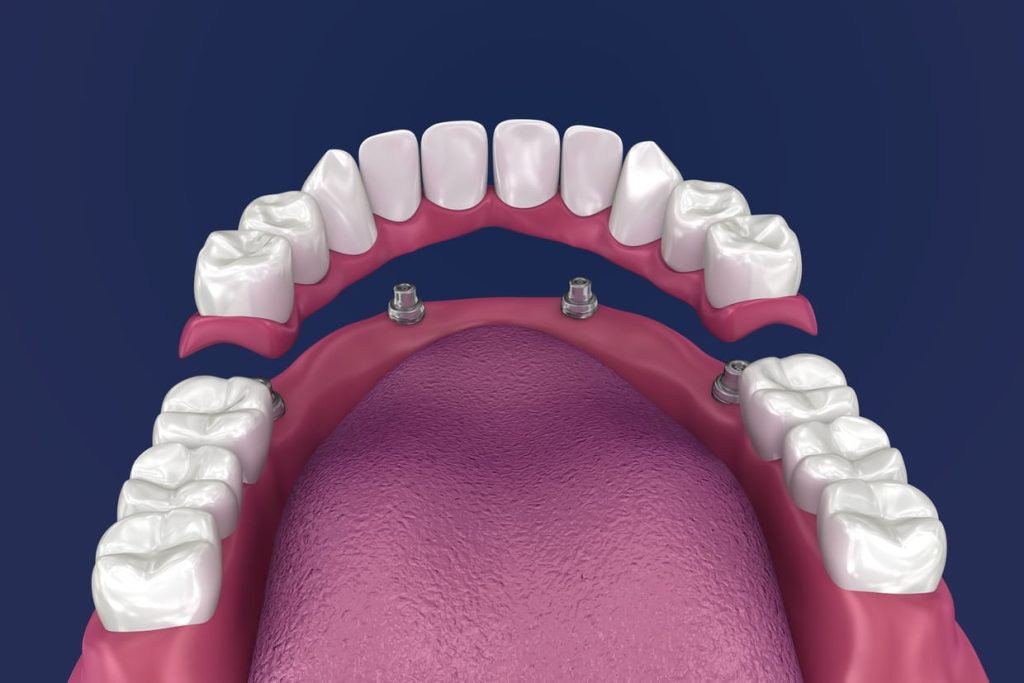
Key Components of Implant Supported Dentures
Implant-supported dentures consist of two primary parts: the titanium implants and the prosthetic denture. The titanium implants are surgically placed into the jawbone, acting like artificial tooth roots. Over time, the bone fuses with these implants in a process called osseointegration, which creates a solid foundation for the dentures.
The prosthetic denture is custom-made to fit securely onto the implants, mimicking the look and feel of natural teeth. The combination of implants and the prosthetic helps restore full functionality, allowing patients to chew, speak, and smile confidently. The implants not only provide stability but also stimulate the jawbone, preventing bone loss that can occur after tooth loss.
Types of Implant Supported Dentures
There are two main types of implant-supported dentures: bar-retained and ball-retained dentures. Both types use implants for stability, but they differ in how the dentures attach to the implants.
- Bar-retained dentures involve a metal bar that is attached to the implants. The denture fits over the bar and clips securely into place, offering excellent stability while still being removable for cleaning. This type is ideal for those who want a secure fit without the need for adhesives.
- Ball-retained dentures, on the other hand, use ball-shaped attachments (also known as “studs”) that fit into corresponding sockets on the dentures. This system offers a snug fit, ensuring that the dentures remain stable while chewing or speaking. Ball-retained dentures can also be removed easily for cleaning, making them a popular choice for convenience.
- Denture Locators. This is similar to the ball type of retention but in place of the ball, there are cylindrical gold studs sticking out from the gums. The denture will have special rubber grips to engage onto these gold studs for a firmer grip and retention of the denture.
Both types of implant-supported dentures offer improved comfort, function, and aesthetics compared to traditional dentures, making them an excellent long-term solution for those with missing teeth.
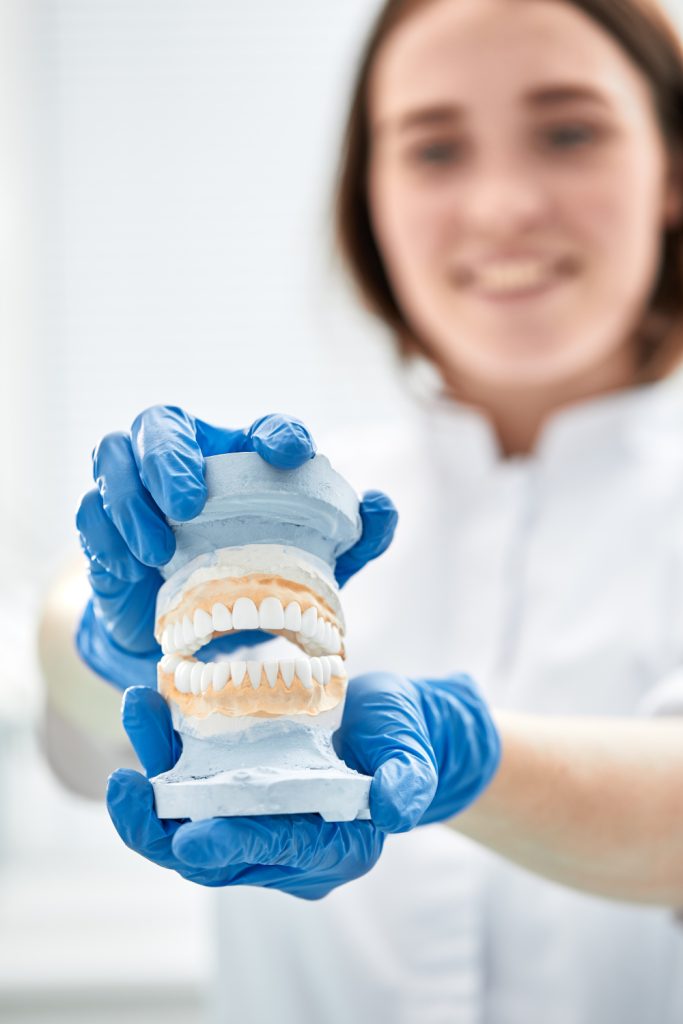
Difference Between Implant Supported Dentures And Traditional Dentures
Traditional dentures rely solely on adhesives or suction to stay in place within your mouth, implant supported dentures are securely anchored to the titanium fixtures of dental implants to give you stability. Let’s take a closer look at the difference between the two:
Comfort and Stability
One of the most significant differences between implant-supported dentures and traditional removable dentures is comfort and stability. Traditional dentures rest on the gums and rely on suction or adhesives to stay in place. However, they can slip or shift during speaking or eating, causing discomfort and limiting function.
In contrast, implant-supported dentures are anchored directly to titanium implants surgically placed into the jawbone. This secure attachment provides superior stability, making them feel more like natural teeth. The enhanced fit eliminates the need for adhesives and prevents the slipping or wobbling often associated with traditional dentures.

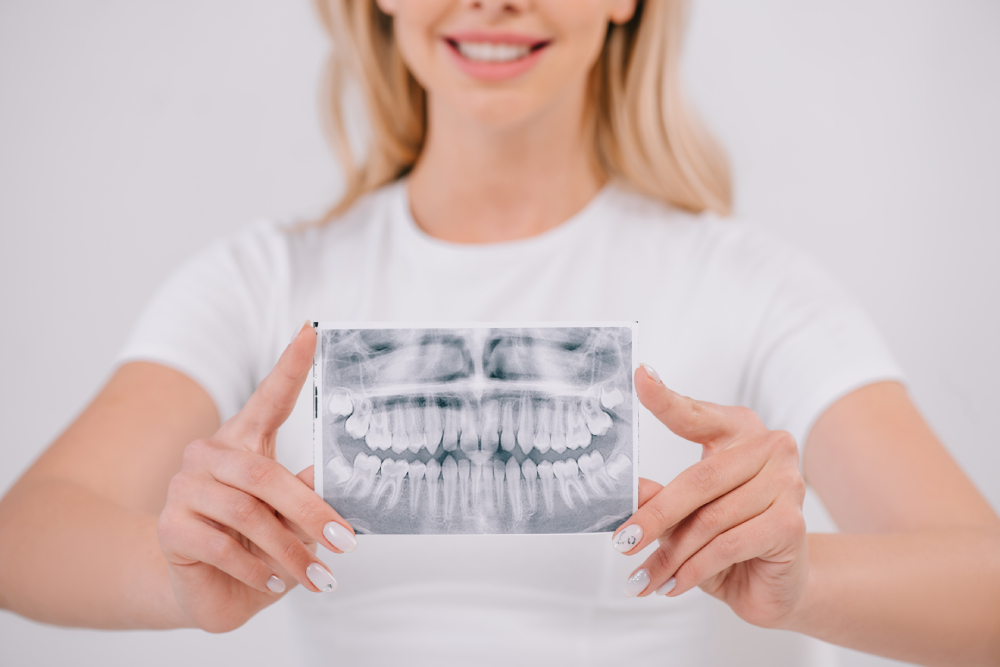
Bone Health Benefits
Implant-supported dentures offer a significant advantage over traditional dentures when it comes to preserving bone health. Traditional dentures rest on top of the gums and do not stimulate the underlying jawbone, which can lead to bone loss over time. As the bone deteriorates, the facial structure can change, leading to a sunken appearance.
Implant-supported dentures, however, fuse with the jawbone through a process called osseointegration. This not only provides a strong foundation for the dentures but also stimulates the bone, preventing further bone loss and helping maintain the natural contours of the face.
Maintenance and Longevity
When comparing maintenance, traditional dentures require frequent removal for cleaning and may need adjustments over time due to bone resorption. They typically last about five to seven years before needing to be replaced. Implant-supported dentures, while initially more costly, have a much longer lifespan.
The implants themselves can last a lifetime with proper care, and the dentures attached to them may only need occasional replacement. Daily maintenance for implant-supported dentures involves regular brushing and flossing, similar to natural teeth, making them a more convenient and long-lasting option.


WHO NEEDS IMPLANT SUPPORTED DENTURES?
Ideal Candidates
Implant-supported dentures are ideal for individuals with significant tooth loss or those who find traditional dentures uncomfortable or unstable. People who have lost multiple teeth, whether from decay, injury, or age-related issues, often struggle with everyday tasks like eating and speaking. Implant-supported dentures offer a more secure, long-lasting solution by anchoring the prosthetic to implants placed into the jawbone.
This ensures the dentures won’t slip or move, improving comfort and functionality. Those who are unsatisfied with the limitations of traditional dentures—such as slippage, irritation, or difficulty chewing certain foods—can greatly benefit from this option. In summary, the ideal candidates are:
- Those who find traditional dentures uncomfortable, or are prone to loose or slipping dentures.
- Those who want better chewing function and more confident speech.
- Those looking for a more natural look that mimics the appearance of natural teeth.
- Those seeking a long-term solution
Consulting with Your Dentist
Before receiving implant-supported dentures, a thorough consultation with your dentist is crucial. During this visit, the dentist will perform an oral examination and review your medical history to determine if you are a suitable candidate. This may include X-rays or 3D imaging to assess bone density and the overall structure of your jaw.
Dentists will evaluate your oral health and determine if your jaw has sufficient bone to support implants. If not, bone grafting procedures may be required before moving forward with the implants. This assessment is essential to creating a personalized treatment plan tailored to your specific needs.


Health Considerations
While implant-supported dentures are a viable option for many, certain health factors can affect eligibility. Adequate bone density in the jaw is necessary to support the implants, and patients with severe bone loss may require additional treatments like grafting. Conditions such as gum disease, diabetes, or smoking can also impact healing and the success of the implants.
If you have underlying health issues, your dentist will discuss whether these factors might affect your candidacy and may suggest alternatives or preparatory treatments. However, with advances in dental technology, many patients can still pursue this option with proper medical guidance.
The Process of Getting Implant Supported Dentures
- A dental surgeon will assess your oral health and discuss your needs to determine if you are a suitable candidate for implant supported dentures.
- A customized treatment plan will be developed. It’ll outline the number of dental implants needed, the type of implant supported denture suitable for you, and the overall timeline of the procedure.
- Dental implants will be surgically inserted into your jawbone. You will then have to go through a healing phase of a few months to allow the implants to integrate with your jawbone.
- Once the implants are fully integrated, impressions of your mouth are taken to create your custom implant supported dentures.
- The dentures will be securely attached to the dental implants to restore your oral function.
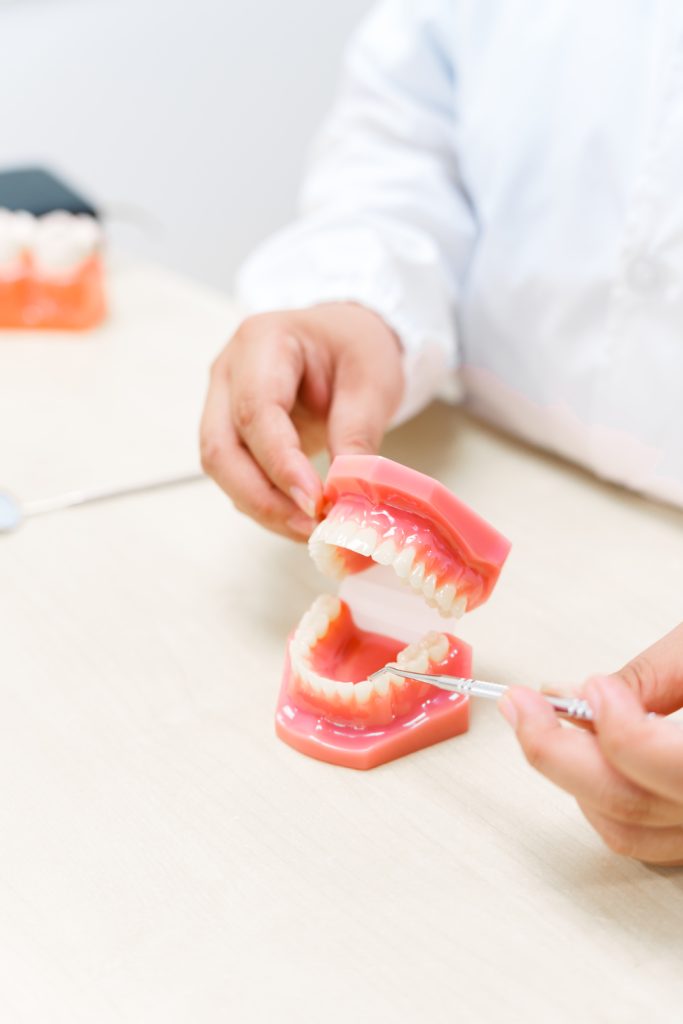
State-of-the-Art
We use techniques to ensure that the implant is placed correctly and heals properly. After the implant is placed, we will work with you to design and create a custom restoration that blends seamlessly with your existing teeth.

Advanced Imaging and Planning Tools
One of the key advancements in implant-supported dentures is the use of 3D imaging and virtual surgery planning. These technologies allow dentists to create highly accurate digital models of a patient’s jaw, which ensures precise implant placement. Using a combination of Cone Beam CT scans and digital impressions, dentists can map the exact location of nerves, bone density, and the ideal spots for implants.
Virtual surgery planning allows dentists to simulate the entire procedure before actually performing it, minimizing risks and improving accuracy. This level of precision ensures that the implants are placed in the most optimal locations, maximizing both functionality and aesthetics.
Innovative Materials for Durability and Aesthetics
Modern implant-supported dentures benefit from cutting-edge materials designed for both durability and a natural appearance. Titanium, used for the implants themselves, is biocompatible and integrates seamlessly with the jawbone, providing a strong foundation. The prosthetic dentures are often made from advanced ceramics or acrylic resins, which mimic the appearance of natural teeth.
These materials are not only durable but also resistant to wear and staining, ensuring that the dentures remain functional and aesthetically pleasing for many years. Additionally, the customization of each denture to match the shape, size, and color of natural teeth enhances the overall appearance, giving patients a confident smile that looks and feels real.
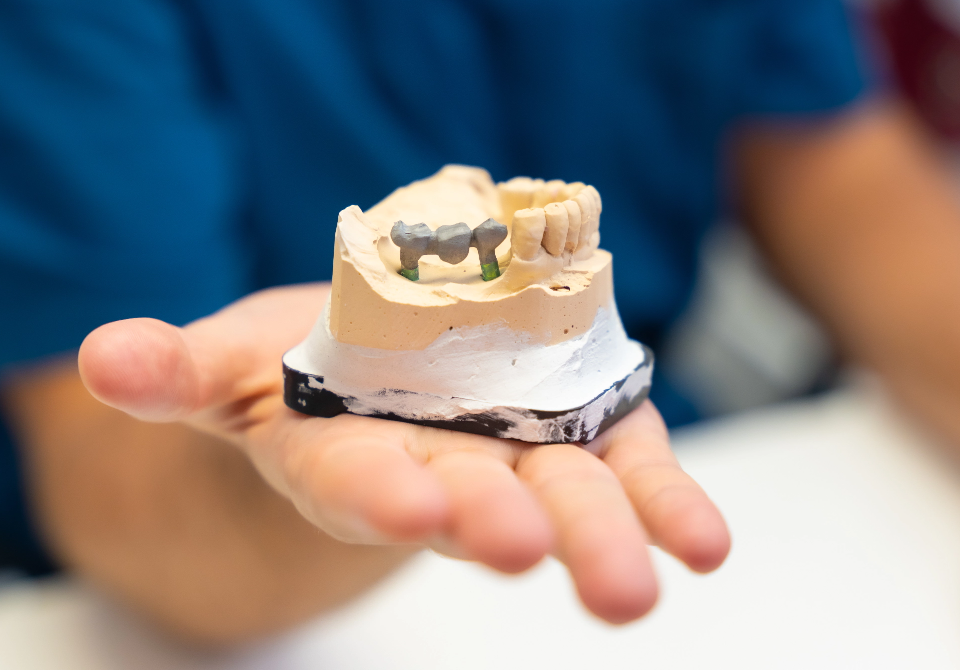
We Care About Your Smile
Our implant placement procedure is safe, efficient, and comfortable. We use techniques to ensure that the implant is placed correctly and heals properly. After the implant is placed, we will work with you to design and create a custom restoration that blends seamlessly with your existing teeth.

Comprehensive Aftercare
After receiving implant-supported dentures, comprehensive aftercare is critical to ensure the long-term success of your new smile. At Tooth Stories, we provide a detailed post-procedure care plan tailored to your specific needs. Proper hygiene is essential, and we recommend regular brushing, flossing, and the use of antibacterial mouthwash to prevent infection around the implants.
We also emphasize the importance of routine check-ups, which allow us to monitor the health of your gums and ensure that the implants remain securely in place. These visits are key to identifying potential issues early, such as gum inflammation or wear on the prosthetic, and addressing them before they compromise your comfort or the durability of your dentures.
Following these aftercare steps can help extend the lifespan of your implant-supported dentures, providing you with a beautiful, functional smile for many years to come.
Your Smile, Our Priority
At Tooth Stories, your smile is our top priority. We understand that dental care is not just about function but also about aesthetics and confidence. Our team is dedicated to offering personalized treatment plans designed around your unique oral health needs, using state-of-the-art technology to provide the highest level of care.
Whether it’s through implant-supported dentures, routine cleanings, or other cosmetic procedures, we are committed to restoring and enhancing your smile.
Our approach combines expertise with a deep commitment to patient care, ensuring you receive the attention and results you deserve. When you choose Tooth Stories, you’re choosing a partner in your oral health journey who will walk with you every step of the way, ensuring your smile stays healthy and radiant for a lifetime.

Frequently Asked Questions for Implant Supported Dentures
Who is suitable for implant supported dentures?
Those with multiple missing teeth and have sufficient jawbone density are suitable for implant supported dentures. Do consult your dental surgeon to determine if you’re eligible.
What is the difference between implant supported dentures and traditional dentures
Implant supported dentures give you more stability and comfort due to the fixtures that are inserted into your jawbone. Traditional dentures rely on adhesives or suction.
What is the recovery time after getting implant supported dentures?
The recovery time varies, but most patients can fully recover within two to three months.
How long do implant supported dentures last?
Implant supported dentures can generally last longer than traditional dentures if properly maintained.
Are implant supported dentures comfortable?
Yes, implant supported dentures are known for their comfort. As they don’t rest on the gums like traditional dentures do, there is less risk of sore spots or discomfort.
